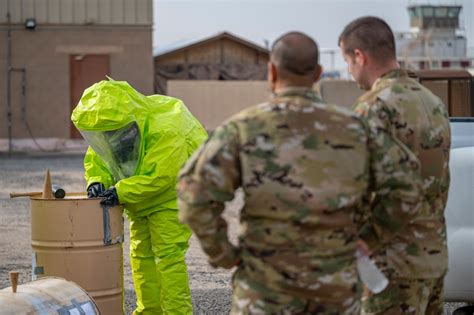Hazmat technicians are the unsung heroes of emergency response. They risk their lives to mitigate hazardous materials incidents, protecting people, the environment, and property from harm. To excel in this critical role, hazmat technicians must possess a unique combination of skills, knowledge, and physical abilities. In this article, we'll explore the 7 essential hazmat technician skills to master, providing a comprehensive overview of the competencies required for success in this demanding field.

1. Hazardous Materials Knowledge
Hazmat technicians must have in-depth knowledge of hazardous materials, including their properties, behavior, and potential risks. This understanding is critical for identifying the type of hazmat involved in an incident, assessing the risks, and developing an effective response strategy. Technicians should be familiar with the following:
- Hazard classification systems (e.g., NFPA 704, HMIS III)
- Material safety data sheets (MSDSs)
- Hazmat transportation regulations (e.g., DOT, IATA)
- Hazmat storage and handling best practices
Relevant Skills:
- Familiarity with hazmat reference materials (e.g., NIOSH Pocket Guide, ERG)
- Understanding of hazmat behavior in different environments (e.g., water, air, soil)
- Ability to identify hazmat using various detection methods (e.g., chemical detection kits, spectrometers)
2. Personal Protective Equipment (PPE) Proficiency
Hazmat technicians must be proficient in the use of personal protective equipment (PPE), which is essential for preventing exposure to hazardous materials. Technicians should be able to:
- Select and don PPE correctly
- Use PPE in accordance with manufacturer instructions and incident-specific requirements
- Perform PPE inspections and maintenance tasks

Relevant Skills:
- Understanding of PPE levels (e.g., Level A, B, C, D)
- Familiarity with PPE components (e.g., respirators, gloves, suits)
- Ability to perform PPE decontamination and disposal procedures
3. Emergency Response Procedures
Hazmat technicians must be familiar with emergency response procedures, including incident command systems, emergency operations plans, and hazmat response protocols. Technicians should be able to:
- Understand incident command structures (e.g., ICS, NIMS)
- Develop and implement response plans for various hazmat incidents
- Coordinate with other response teams (e.g., fire, medical, law enforcement)
Relevant Skills:
- Familiarity with emergency response protocols (e.g., NFPA 472, OSHA 29 CFR 1910.120)
- Understanding of incident size-up and risk assessment procedures
- Ability to communicate effectively with other response teams and stakeholders
4. Decontamination and Disposal Procedures
Hazmat technicians must be able to perform decontamination and disposal procedures for hazmat and equipment. Technicians should be able to:
- Understand decontamination methods (e.g., washing, neutralization, disinfection)
- Select and use decontamination solutions and equipment
- Dispose of hazmat and contaminated equipment in accordance with regulations

Relevant Skills:
- Familiarity with decontamination equipment (e.g., showers, wash stations)
- Understanding of personal decontamination procedures (e.g., gross decon, technical decon)
- Ability to perform equipment decontamination and disposal procedures
5. Communication and Teamwork Skills
Hazmat technicians must be able to communicate effectively with other response teams, stakeholders, and the public. Technicians should be able to:
- Communicate clearly and concisely using various communication methods (e.g., radio, phone, in-person)
- Work effectively in a team environment, including as part of an incident command system
- Provide public information and education on hazmat response and safety
Relevant Skills:
- Familiarity with communication protocols (e.g., radio etiquette, phone procedures)
- Understanding of team dynamics and conflict resolution
- Ability to provide public information and education on hazmat response and safety
6. Physical and Mental Demands
Hazmat technicians must be physically and mentally fit to perform their duties, which can be demanding and hazardous. Technicians should be able to:
- Wear PPE for extended periods
- Work in hot, cold, or other extreme environments
- Respond to incidents in a timely and effective manner

Relevant Skills:
- Familiarity with physical demands of hazmat response (e.g., lifting, carrying)
- Understanding of mental health and wellness strategies
- Ability to manage stress and fatigue during incident response
7. Continuous Learning and Professional Development
Hazmat technicians must commit to continuous learning and professional development to stay current with changing regulations, technologies, and best practices. Technicians should be able to:
- Participate in training and exercises to maintain and improve skills
- Stay current with industry developments and research
- Share knowledge and experience with other technicians and response teams
Relevant Skills:
- Familiarity with training programs and exercises (e.g., Hazmat Operations, Hazmat Technician)
- Understanding of industry developments and research (e.g., new technologies, emerging threats)
- Ability to share knowledge and experience with other technicians and response teams






By mastering these 7 essential hazmat technician skills, individuals can excel in this critical role, providing effective response to hazmat incidents and protecting people, the environment, and property from harm.
We encourage you to share your thoughts and experiences in the comments section below. What skills do you think are most essential for hazmat technicians? How can we improve hazmat response and safety?
What is the primary role of a hazmat technician?
+The primary role of a hazmat technician is to respond to and mitigate hazardous materials incidents, protecting people, the environment, and property from harm.
What are the key skills required for a hazmat technician?
+The key skills required for a hazmat technician include hazardous materials knowledge, personal protective equipment proficiency, emergency response procedures, decontamination and disposal procedures, communication and teamwork skills, physical and mental demands, and continuous learning and professional development.
How can hazmat technicians improve their skills and knowledge?
+Hazmat technicians can improve their skills and knowledge by participating in training and exercises, staying current with industry developments and research, and sharing knowledge and experience with other technicians and response teams.
